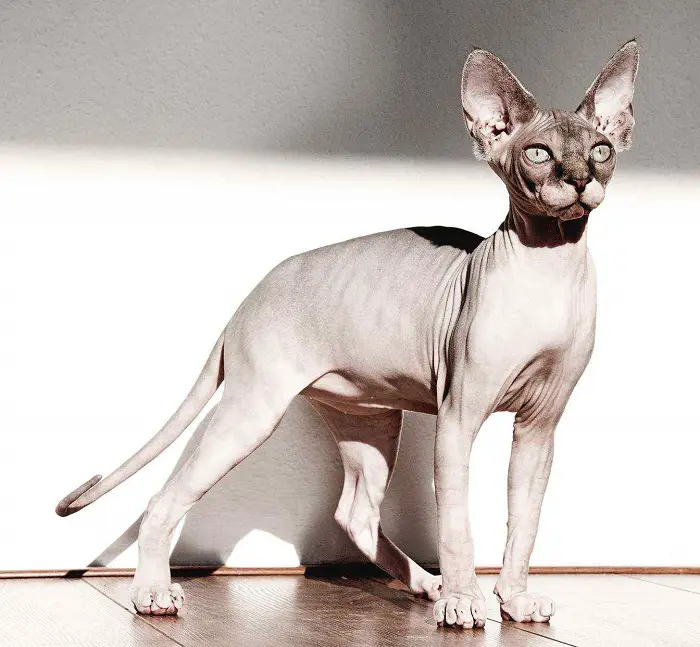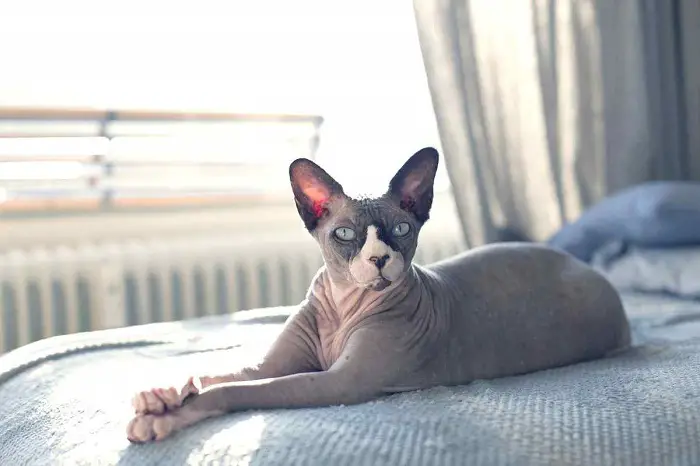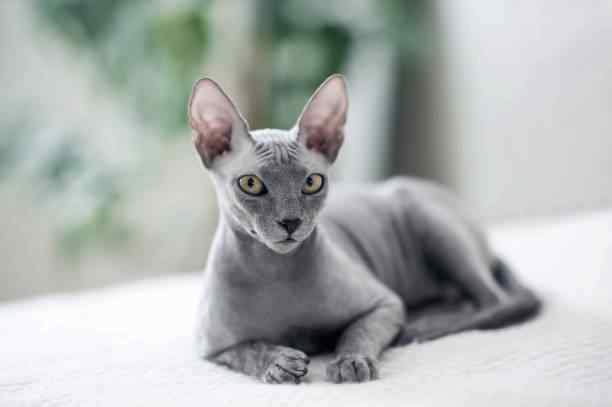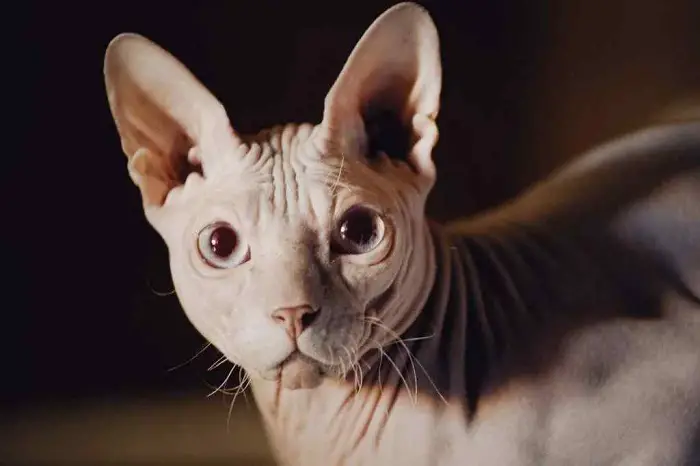The Sphinx cat, often spelled as “Sphynx,” is a breed of domestic cat known for lacking a traditional fur coat. It’s recognized by its nearly hairless appearance, large ears, and wrinkled skin. Despite their apparent lack of hair, Sphynx cats are not genuinely bald; they have an excellent layer of peach-fuzz-like hair covering their bodies.
The Sphynx cat breed originated in the 1960s when a naturally occurring genetic mutation led to the birth of hairless kittens. Breeders then began selectively breeding these cats to establish the Sphynx breed. Their unique appearance and engaging personality have made them popular pets among cat enthusiasts.
Origin and History of Sphynx Cat
The origin and history of the Sphynx cat breed can be traced back to the mid-20th century and involves a combination of natural genetic mutations and intentional breeding efforts. Here’s a brief overview of how the Sphynx cat came into existence:
- Natural Mutation: The Sphynx breed began with a natural genetic mutation. In 1966, a domestic cat named Prune gave birth to a hairless kitten named Epidermis in Toronto, Canada. Epidermis had no fur due to a spontaneous genetic mutation. However, this mutation did not cause health issues for the kitten, and it eventually became the foundation for the Sphynx breed.
- Selective Breeding: Recognizing the potential of this unique hairless trait, breeders started a selective breeding program to create a new breed of cats with this distinctive appearance. The goal was to maintain the hairless trait while focusing on health, temperament, and overall conformation.
- Crossbreeding: To diversify the gene pool and reduce the chances of genetic issues resulting from inbreeding, breeders crossed the hairless cats with other cat breeds, including domestic shorthairs, Devon Rex, and American Shorthairs. This crossbreeding helped establish a stable gene pool and improved the breed’s overall health.
- Recognition and Development: Despite the challenges associated with breeding hairless cats, dedicated breeders worked to develop the Sphynx breed. In the 1980s, various cat organizations, such as The International Cat Association (TICA) and the Cat Fanciers’ Association (CFA), began recognizing the Sphynx as an official breed.
- Continued Refinement: Over the years, breeders have refined the Sphynx breed, selecting desirable traits such as a well-rounded body, large ears, and a friendly disposition. They aimed to create a breed with a unique appearance while also addressing potential health concerns that could arise from hairlessness.
- International Recognition: The Sphynx breed gained popularity beyond Canada and the United States, spreading to other countries worldwide. Breeders and cat enthusiasts in various regions have contributed to the breed’s development and popularity.
Today, Sphynx cats are well-known as a distinct and recognized breed in many cat associations. They are known for their striking appearance, affectionate nature, and special care requirements due to their lack of fur. While they have unique needs compared to other cat breeds, their engaging personalities and distinct look have earned them a dedicated following among cat lovers worldwide.
Physical Features of Sphynx Cat
The Sphynx cat is known for its distinctive and unique physical features, which set it apart from other cat breeds. Here are the key physical characteristics of the Sphynx cat:
- Hairlessness: The most noticeable feature of the Sphynx cat is its nearly hairless appearance. While it might appear completely bald, Sphynx cats have a fine layer of downy hair covering their bodies. This delicate hair gives them a soft and velvety feel to the touch.
- Wrinkled Skin: Sphynx cats often have wrinkled or loose skin, particularly around their head, neck, and body. The skin is more noticeable in some areas due to the lack of fur to cover it.
- Ears: Sphynx cats typically have large ears set quite apart on the head. The ears are wide at the base and may have a slightly rounded tip.
- Eyes: They are large and expressive, contributing to their engaging appearance. Eye color can vary widely and is not necessarily linked to coat color.
- Body Shape: Sphynx cats have a well-muscled and sturdy body. They are medium to large and have a rounded abdomen. Despite their hairlessness, they should still have some body fat to provide insulation and warmth.
- Tail: Their tails are long and slender, often tapering to a slightly pointed tip.
- Color and Patterns: Sphynx cats come in various colors and patterns, just like other cat breeds. The lack of fur can make their coat color and patterns more pronounced and visible.
- Whiskers and Eyebrows: Sphynx cats might have very short and sparse whiskers, and some may even lack eyebrows, which adds to their unique appearance.
- Skin Texture: The skin of a Sphynx cat is soft and smooth in touch, similar to the texture of human skin. It’s important to note that their skin is more susceptible to sunburn and temperature changes due to the absence of fur.
- Personality: While not a physical feature, the Sphynx cat’s personality is a significant aspect of the breed. They are known for being affectionate, social, and playful. They enjoy interacting with people and other pets and often seek warmth and closeness.
Colors and Appearance of Sphynx Cat
Like other cat breeds, sphynx cats are found in various colors and patterns. The absence of fur can make their coat colors and patterns more prominent and visually striking. Here are some of the standard coat colors and patterns you might find in Sphynx cats:
Solid Colors:
- Black: Solid black Sphynx cats have a sleek and elegant appearance.
- White: White Sphynx cats have a clean and striking look due to the absence of fur.
Color Points:
- Seal Point: This pattern features a darker color on the ears, face, paws, and tail, while the body is a lighter shade.
- Blue Point: Similar to seal points, but with a bluish-gray color on the ears, face, paws, and tail.
Tabby Patterns:
- Classic Tabby: This pattern features swirls or “bull’s-eye” markings on the sides of the body, often resembling a marble pattern.
- Mackerel Tabby: Mackerel tabby Sphynx cats have narrow stripes running down their bodies and legs, resembling a fishbone pattern.
- Spotted Tabby: Sphynx cats with a spotted tabby pattern have distinct spots on their bodies, similar to a leopard.
Bi-Color and Calico Patterns:
- Bi-Color: These Sphynx cats have two distinct colors on their bodies, usually solid and white. The color distribution can vary.
- Calico: Calico Sphynx cats have a mix of white, black, and orange patches, creating a vibrant and eye-catching appearance.
Other Patterns:
- Tortoiseshell (Tortie): Tortoiseshell Sphynx cats have a combination of black and orange patches on their bodies.
- Dilute: Dilute Sphynx cats have soft and muted versions of standard colors, such as dilute calico, tortoiseshell, or tabby patterns.
Color Points with White:
- Lynx Point: Similar to color points, but with tabby markings (lynx points) on the ears, face, paws, and tail.
- Tortie Point: These cats have color point patterns combined with tortoiseshell colors.
The Behavior of Sphynx Cat
Sphynx cats are known for their distinctive and engaging behavior. Their social and affectionate nature and lack of fur make them stand out among other cat breeds. Here are some common behavioral traits of Sphynx cats:
- Affectionate: Sphynx cats are renowned for their affectionate and loving personalities. They enjoy being close to their human companions and often seek out physical contact, whether cuddling on your lap or nuzzling against your face.
- Social: These cats are highly social creatures. They thrive on interaction and companionship, both with humans and other pets. Sphynx cats follow their owners around the house and enjoy being part of family activities.
- Playful: Sphynx cats have a playful and active nature. They enjoy interactive toys, puzzle games, and playtime with their human companions. Regular play sessions help keep them mentally and physically stimulated.
- Curious: Like many cats, Sphynx cats are curious by nature. They like exploring their environment and investigating new things. Providing them with a stimulating and enlighted environment can satisfy their curiosity.
- Attention-Seeking: Sphynx cats often crave attention and can be pretty demanding. They might paw at you, jump onto your lap, or meow to get your attention. Their desire for companionship makes them excellent pets for people who can spend time with them.
- Warmth-Seeking: Sphynx cats have a higher body temperature than other cat breeds due to their lack of fur. As a result, they often seek out warm locations in the house, such as sunny windowsills or cozy blankets.
- Vocal: Sphynx cats are known for their vocalizations. They might communicate with a variety of meows, chirps, and purrs. Some Sphynx cats have a soft, melodic voice, while others can be more chatty.
- Bonding: Sphynx cats often form strong bonds with their human companions. They enjoy being involved in daily activities and might even follow you from room to room to stay close.
- Friendly: Their friendly nature makes Sphynx cats adaptable to different situations, including meeting new people. They are often comfortable with strangers and can be pretty welcoming.
- Grooming and Skin Care: Sphynx cats still require grooming despite lacking fur. Their skin needs regular cleaning to prevent oil buildup, and they might need occasional baths.
Food and Nutrition of Sphynx Cat
Feeding a Sphynx cat a balanced and appropriate diet is vital for maintaining its health and well-being. While the nutritional needs of Sphynx cats are similar to those of other cat breeds, their lack of fur and higher body temperature affect their dietary requirements. Here are some guidelines for feeding a Sphynx cat:
- High-Quality Cat Food: Choose high-quality commercial cat food with a balanced diet. Look for foods formulated for the cat’s life stage (kitten, adult, senior) and labeled as “complete and balanced” according to the standards of cat nutrition organizations.
- Protein: Cats are obligate carnivores and need a diet rich in animal-based protein. Ensure the cat food you choose has a high protein content, ideally from chicken, turkey, fish, or other meats.
- Fat: Adequate dietary fat is essential for Sphynx cats, as it helps maintain their energy levels and supports healthy skin and coats. Look for cat foods with moderate fat content.
- Carbohydrates: Cats don’t have a strict dietary requirement for carbohydrates, and their diets should be relatively low in carbohydrates. Choose foods that have limited grain content and rely more on animal-based ingredients.
- Moisture: Cats have a limited thirst drive, so it’s essential to ensure they get enough moisture in their diet. Wet cat food or adding water to dry food can help prevent dehydration and support urinary tract health.
- Avoid Overfeeding: Sphynx cats might have a higher metabolism due to their elevated body temperature. Be mindful of ration sizes to prevent overfeeding and maintain a healthy weight.
- Consult a Veterinarian: Every cat is unique, and their dietary needs can vary based on age, activity level, health status, and individual preferences. Consult a vet to determine the best feeding plan for your Sphynx cat.
- Special Considerations: Sphynx cats might have special dietary considerations due to their lack of fur and higher body temperature. Their skin might be more sensitive, so providing essential fatty acids and other minerals that support skin health can be beneficial. Omega-3 fatty acids from fish oil can contribute to skin health.
- Allergies and Sensitivities: Some Sphynx cats might have food allergies or sensitivities. If you notice signs of gastrointestinal upset, skin issues, or other unusual symptoms, consult a veterinarian to rule out any dietary concerns.
- Treats: While offering treats occasionally is fine, they should not make up a significant portion of your cat’s diet. Choose cat-friendly treats and use them sparingly.
Care of Sphynx Cats
Caring for a Sphynx cat involves unique considerations due to its lack of fur and higher body temperature. Here’s a comprehensive guide on how to properly care for your Sphynx cat:
- Regular Baths for Your Cats: Due to their lack of fur, Sphynx cats produce more skin oils that can accumulate on their skin. Regular baths (about once a week) are necessary to keep their skin clean and healthy. Use a gentle, hypoallergenic cat shampoo and warm water.
- Skin Moisturizing: Apply a pet-safe, non-greasy moisturizer to your cat’s skin after baths to avoid becoming too dry. Consult your veterinarian for suitable products.
- Sun Protection: Sphynx cats are sensitive to the sun and can easily get sunburned. Avoid direct sunlight, especially during peak hours, and provide shaded areas if your cat is outdoors. Pet-safe sunscreen can also be applied to exposed areas.
- Temperature Regulation: Sphynx cats have a higher body temperature than other cats. Ensure they have warm spots in your home, and consider providing them with clothing or blankets to help regulate their body temperature.
- Nail Trimming: Regular nail trimming is essential to prevent overgrown nails. Use cat-specific nail clippers, and be cautious not to cut too close to the blood vessel inside the nail.
- Ear Cleaning: Sphynx cats’ ears are larger and more exposed, making them prone to dirt and debris buildup. Clean their ears gently with a damp cloth or a specially formulated ear cleaner. Avoid inserting anything into the ear canal.
- Eye Care: Keep an eye on their eyes for signs of discharge or irritation. Use a damp cloth to clean around their eyes if needed gently.
- Dental Care: Regularly brush your Sphynx cat’s teeth to prevent dental issues. Use a cat-specific toothbrush and toothpaste. Dental treats and toys can also contribute to oral health.
- Feeding and Nutrition: Feed high-quality cat food that meets their nutritional needs. Monitor their weight and adjust portion sizes to maintain a healthy body condition.
- Regular Veterinary Check-ups: Schedule regular veterinary visits to monitor your cat’s overall health and address specific needs. Sphynx cats might be more susceptible to certain health issues due to their lack of fur, so early detection is essential.
- Social Interaction: Sphynx cats are social and crave human companionship. Spend quality time with your cat, engage in play, and provide mental stimulation to keep them happy and well-adjusted.
- Environmental Enrichment: Provide plenty of toys, scratching posts, and interactive play to stimulate your Sphynx cat mentally. Climbing trees and puzzle feeders are great options.
- Litter Box Care: Keep the litter box clean and scoop it daily. Sphynx cats might be more sensitive to litter textures, so choose a litter that they find comfortable.
- Hygiene: Clean their skin folds (if applicable) and ensure they are debris-free to prevent skin issues.
- Health Monitoring: Be vigilant for any signs of illness, changes in behavior, or discomfort. Sphynx cats’ lack of fur can make skin issues more noticeable, so pay close attention to their skin health.
The Health of Sphynx Cat
Sphynx cats are generally healthy and resilient but have specific health considerations due to their unique physical characteristics, such as lack of fur and higher body temperature. Regular veterinary care, proper grooming, and attention to their unique needs are essential for their overall health. Here are some common health considerations for Sphynx cats:
- Skin Health: Because Sphynx cats lack fur, they are more exposed and prone to sunburn, dryness, and other skin issues. Regular bathing, moisturizing, and sun protection are crucial to prevent skin problems.
- Sun Protection: Sphynx cats have sensitive skin that is susceptible to sunburn. Keep them indoors during peak sun hours and provide shaded areas if they’re outdoors. Use pet-safe sunscreen on exposed skin.
- Temperature Sensitivity: Sphynx cats can get cold more quickly due to their higher body temperature. Provide warm spots in your home, and consider using clothing or blankets to help them stay comfortable.
- Ear Care: Their large ears are more exposed to dirt and debris. Regular ear cleaning can help prevent ear infections. However, be careful not to insert anything into the ear canal.
- Eye Health: Monitor their eyes for signs of discharge, redness, or irritation. If you notice any issues, consult a veterinarian.
- Respiratory Issues: Some Sphynx cats might be more prone to respiratory issues due to their unique skull structure. Avoid exposure to smoke, chemicals, and other irritants.
- Heart Health: Sphynx cats can be predisposed to hypertrophic cardiomyopathy (HCM), a heart condition that affects the heart muscle. Regular veterinary check-ups can help monitor their heart health.
- Dental Health: Dental hygiene is essential for all cats, including Sphynx cats. Regular tooth brushing and dental check-ups can help prevent dental issues.
- Gastrointestinal Sensitivity: Some Sphynx cats might have sensitive stomachs or dietary sensitivities. Monitor their digestion and consult a veterinarian if you notice any issues.
- Allergies: Sphynx cats might be more sensitive to allergens, including environmental and certain foods. Pay attention to any signs of allergic reactions.
- Weight Management: Sphynx cats might have specific dietary needs due to their higher metabolism. Monitor their weight and adjust their diet to maintain a healthy body condition.
- Infections: Sphynx cats can still develop skin infections, so be vigilant for any signs of redness, swelling, or discomfort.
- Regular Vet Check-ups: Routine veterinary visits are crucial to monitor your Sphynx cat’s overall health and address any potential issues early.
Sphynx Cats For Sale
If you’re interested in getting a Sphynx cat, there are several ways to find one for sale. However, it’s essential to approach the process responsibly to ensure you’re getting a healthy and well-cared-for cat from a reputable source. Here are some steps to consider:
- Research Breeders: Look for reputable breeders who specialize in Sphynx cats. Research their backgrounds, reviews, and any available information about their breeding practices. Responsible breeders prioritize the health and well-being of their cats.
- Visit Catteries: Visit the catteries where the Sphynx cats are raised. This allows you to meet the cats, observe their living conditions, and assess how well they are cared for.
- Ask Questions: Reach out to breeders with questions about their breeding practices, the health history of their cats, and any certifications they might have. Responsible breeders should be willing to answer your questions openly.
- Health Screening: Reputable breeders conduct health screenings for genetic and hereditary issues in their breeding cats. Ask about any health tests done on the cat’s parents.
- Contracts and Guarantees: Responsible breeders often provide contracts that outline the responsibilities of both the buyer and the seller. These contracts may include health guarantees and other terms.
- Avoid Pet Stores: Avoid purchasing from pet stores, as they might source their animals from puppy mills or other unethical sources.
- Adoption: Consider adopting a Sphynx cat from a rescue or shelter. While Sphynx cats might be less common in shelters, it’s still worth checking local rescue groups or breed-specific rescues.
- Pricing: Sphynx cats are typically more expensive than other cat breeds due to their unique traits. However, be cautious if the price seems unusually high or low, as this could be a red flag.
- Meet the Cat: Meet the Sphynx cat before deciding. This allows you to assess their temperament and whether they are a good match for your lifestyle.
- Health Check: Once you decide on a cat, have them examined by a veterinarian before finalizing the purchase. This helps ensure the cat is healthy and free from underlying health issues.
Fun Facts About Sphynx Cats
Sphynx cats are fascinating and unique creatures with several fun and exciting characteristics. Here are some fun facts about Sphynx cats:
- They’re Not Truly Hairless: Despite their apparent lack of fur, Sphynx cats have a fine layer of downy hair on their bodies. This gives them a soft and velvety texture.
- Originated from a Natural Mutation: The Sphynx cat breed began with a natural genetic mutation that led to the birth of a hairless kitten named Epidermis in the 1960s.
- Warm to the Touch: Sphynx cats have a higher body temperature than other cat breeds, so they often feel warm to the touch.
- They Love Attention: Sphynx cats are known for being social and affectionate. They thrive on human companionship and are often called “dog-like” due to their friendly and interactive nature.
- Mischievous Personalities: Sphynx cats are known for their playful and mischievous behavior. They enjoy exploring their environment and engaging in interactive play.
- Highly Vocal: Sphynx cats are pretty chatty and can be quite vocal, expressing themselves with various meows, purrs, and trills.
- Diverse Coat Colors and Patterns: Sphynx cats come in various coat colors and patterns, which can be more noticeable due to their lack of fur.
- Unique Facial Expressions: Their large ears and prominent cheekbones give Sphynx cats a distinctive and expressive look, often resembling aliens or gremlins in appearance.
- Grease Spots: Due to their skin’s natural oil production, Sphynx cats might leave “grease spots” on surfaces they come into contact with. Regular bathing helps manage this oiliness.
- Hearts of Gold: Sphynx cats are known for their affectionate and loving nature. They often seek out physical contact and warmth from their human companions.
- Great Companions for Allergies: While no cat is entirely hypoallergenic, some people with cat allergies find Sphynx cats more tolerable due to their reduced shedding of fur.
- Unique Sleeping Positions: Sphynx cats are known for their amusing and unusual sleeping positions. They often find cozy spots to curl up, whether it’s on a warm laptop or under a blanket.
- Thermal Hogs: Sphynx cats love heat and will seek out warm spots in the house, including sunny windowsills and radiators.
- Dramatic Personalities: Sphynx cats often have expressive and dramatic personalities, making them entertaining companions.
- They Wear Clothes: Some Sphynx owners dress their cats in clothing to help regulate their body temperature and protect their sensitive skin from the elements.
Concluding Remarks on Sphynx Cat
Sphynx cats are truly one-of-a-kind feline companions, known for their distinctive appearance, affectionate personalities, and unique care requirements. Their nearly hairless bodies, large ears, and engaging expressions make them stand out among other cat breeds.
Sphynx cats are perfect for individuals and families who appreciate their unique traits and are willing to provide the specialized care they need. If you’re ready for a visually striking cat and a loving and affectionate companion, the Sphynx cat might be the perfect addition to your home. Remember to research thoroughly, seek expert advice, and be prepared for the rewarding journey of sharing your life with one of these remarkable felines.



